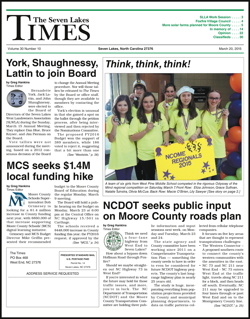 Bringing more water to the greater Seven Lakes area is at the top of the agenda for the Moore County Board of Commissioners this year.
Bringing more water to the greater Seven Lakes area is at the top of the agenda for the Moore County Board of Commissioners this year.
The Board concluded its annual two-day budget retreat, held January 13 and 14 at the Moore County Senior Center, with a goal-setting exercise moderated by Agricultural Extension Director Craven Hudson. The result was a list of ten goals for 2011 and six additional long terms goals. At the top of the list was finding a "Seven Lakes Water Solution."
“The only reason I stayed for four more years," said Commissioner Larry Caddell, referring to his recent re-election to the Board, "is because I promised my friends in Seven Lakes that I would take care of this.”
"We don’t need to wait to find water. We need to find it now,” Caddell said.
And, if the right deal can be negotiated, the Commissioners would like to find that water in the Town of Robbins.
The County plans to reopen negotiations with Robbins within the next forty-five days to determine whether the two local governments can work together to utilize a reservoir and mothballed water treatment plant that Robbins owns but is unable to use. Currently, Robbins buys water from neighboring Montgomery County.
The Robbins plant could pump as much as one million gallons per day of water into the county system that serves Seven Lakes and Pinehurst, through a new water line that would likely run down NC Highway 705 to NC Highway 211 and on to Seven Lakes to tie into the county system. Previous estimates have placed the cost of that water line and its pump stations at approximately $3.6 million -- and rehabbing the Robbins water plant is likely to cost nearly that much again.
The possibility of bringing water in from the Robbins treatment plant has gone back and forth for more than two years without any agreement being reached, but the Commissioners appeared determined to go back to the table with the intention of finally making a deal.
More Options for More Water
Public Utilities Director Dennis Brobst outlined three other options for increasing water supply to the Western end of the county system, including bringing purchased water from Montgomery County down a new line along NC Highway 211 and two different options for buying water from Randolph County.
Water is currently pumped to Seven Lakes thorugh a single water main that can carry over a million gallons of water per day. Currently, the area uses at most 880,000 gallons per day, Brobst noted that that Seven Lakes could be forty percent larger than it is now when fully built out.
Moore County Public Utilities is poised to bring online Pinehurst Wells 5A and 9, which will supply an additional 500,000 gallons of water a day. In addition, new Well 6A will add a water supply of 65,000 gallons a day and should be completed in June.
Reduce ALS Tax
Holding the line on -- or reducing -- taxes has been a Board of Commissioners' goal in each of the last two years and this year is no exception. The target this year is the Advance Life Support [ALS] tax, a two-cent per hundred levy added on top of regular property taxes to support the county's Emergency Medical Services.
The Board cut the ALS tax rate from 2.5 cents in Fiscal Year 2009-2010 to two cents that year, and appears ready to shave off at least another half-cent for Fiscal Year 2011-2012. The levy is expected to generate $2.3 million in tax revenue this year.
During his presentation during the retreat, Public Safety Director Bryan Phillips asked the Board to consider the cost of replacing equipment, hiring more personnel, and the completion of system upgrades. Public Safety is seeing the number of calls for service grow, while, at the same time, it is becoming more and more difficult to recruit volunteers. As a result, departments are hiring firefighters instead of relying exclusively on volunteers.
Phillips asked the Board to leave the ALS tax rate at the current two cents, and consider an increase to three cents in 2016 or 2017. If no additional revenues are collected to offset these costs, Phillips warned, the EMS fund balance would drop below $300,000 by 2018.
But, during their discussion of budget goals, the Commissioners seemed determined, as Commissioner Tim Lea put it, to "keep taxes low.”
"At a minimum, it [the ALS tax rate] should be cut by half a cent,” Chairman Nick Picerno said.
One strategy for cutting Public Safety department costs is to combine fire departments with rescue squads, so they can share a single facility, as is currently the case with West End Fire and Rescue. Another option is to merge fire departments that serve adjacent areas. Phillips gave an example of the West End and Seven Lakes fire departments -- which are headquartered roughly two miles apart.
Last year, the county approved the merger of the Cameron Fire Department, Circle V Fire Department, and Vass Rescue Squad into Cypress Pointe Fire and Rescue. The county is currently served by sixteen fire departments.
The board agreed that a better system is needed, including the strategic placement of fire, rescue, and EMS facilities. “We need to address this issue with experts," Commissioner Jimmy Melton said, "to find out the actual costs and figure out the most effective way to solve these issues.”
Fund Airport Improvements
With both the Men's and Women's US Open coming to Pinehurst in 2014, supporting infrastructure upgrades at the Moore County Airport was among the Commissioners' goal for the coming year.
Ron Maness, the airport's Executive Director, presented the Board with several action items, including ramp capacity, runway length, runway safety, and beautifying Aviation Drive. Many of those issues can be addressed with grant money from the Federal Aviation Administration, but a local match will be required from the County.
One of the chief concerns, Maness said, is extending the runway to a full 6,000 feet from the current 5,500. He explained that runway length was a factor in Delta Airlines' decision to drop commercial service at the airport, because the runway length meant they couldn't fully load their planes.
“Delta Airlines couldn’t sell seats at capacity," Maness said. "They were only selling at 60 percent.”
In addition, some planes cannot take off from the shorter runway with a full load of fuel, which has hurt fuel sales, one of the main revenue sources for the airport. Fuel sales are currently down by 56 percent, Maness said.
“It is important to the county that we see this project through,” Commissioner Jimmy Melton said. Bidding on the runway extension will begin in February.
Other improvements to the airport include painting hangers, replacing equipment and getting a new sign for the median on Airport Road. Progress Energy is expected to donating lighting for Airport Road.
Maness stressed to the board that many corporate visitors pass through the airport, which also brings in tourism dollars.“It is the first impression of our community,” he added.
Promote the Mega Park
Promoting the Heart of Carolina Mega Park, an 3,000-acre potential industrial site that sits astride the Moore-Montgomery County border between Star and Robbins was another goal set by the Board of Commissioners during their January 13-14 budget retreat.
Partner in Progress Director Ray Ogden updated the Board on the status of the Mega Park, which hopes to attract distribution, manufacturing, and biotech industries. With its close proximity to NC Highway 24/27, Spies Road, and Interstate 73/74, it is in an “ideal location for industries” and “will drive a lot of business,” Ogden said.
Commissioner Lea has spearheaded the Board's involvement in the project and urged that promoting the park be set as a goal for the BOC. He said the Mega Park would create, “jobs, jobs, jobs.” Commissioner Craig Kennedy agreed, stating, “The most important thing is to bring jobs into Moore County.”
The land for the park is divided into 500-600 acre parcels to be developed in an “environmentally friendly way,” Ogden said. An adequate supply of water is crucial to the development of the Mega Park, which sits near an existing line that runs from Montgomery County to Robbins. How to best supply water to the site is likely to figure into the Board's thinking about how best to bring additional water to residents and businesses in the Seven Lakes area.
To date, the park has established a Board of Directors, adopted by-laws, and applied for 501C3 status. The next step is to develop a master site plan and have the site certified by the state.
Ogden estimated the project could “last twenty years, but would change the dynamic of the economy of central North Carolina.” The Mega Park was recently turned down by the NC Rural Economic Development Center for a grant, but is reapplying. The outcome should be known in March.
Completing Wastewater Projects
Among the Commissioner's other goals for the year is getting construction started on a major upgrade to the the Addor Water Pollution Control Plant, expanding the capacity of the plant from 6.7 million gallons per day to 10 million gallons per day, which is expected to meet the county's needs for twenty years.
A funding plan for the $32 million project has been approved by the NC Construction Grants and Loans Section, and Commissioner Larry Caddell urged that the project be quickly moved to the bid phase, so that it can move forward to the next phase of implementation. The project includes rehabilitation and modernization of the current facility, which was built in 1977.
Also among the Board's goals for this year is completion of a wastewater project in Vass, which will expand that community's sewer system to serve more residents and connect Vass to the county's wastewater plant in Addor.
